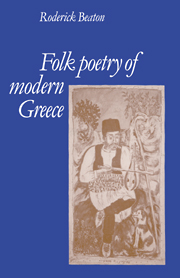Book contents
- Frontmatter
- Contents
- Preface
- Maps
- 1 INTRODUCTION
- 2 THE DEMOTIC TRADITION: THE SONGS
- 3 STRUCTURE OF THE DEMOTIC TRADITION: THE FORMULA
- 4 STRUCTURE OF THE DEMOTIC TRADITION: IMAGERY AND THEMES
- 5 THE EMERGENCE OF THE DEMOTIC TRADITION
- 6 FUNCTION OF THE DEMOTIC TRADITION: THE SONGS AND HISTORY
- 7 THE SONGS AS MYTH
- 8 ONE TRADITION OR SEVERAL?
- 9 THE HISTORICAL TRADITION
- 10 GREEK FOLK POETRY AND WRITING
- Notes
- Glossary of Greek words transliterated in the text
- Bibliography
- Index
6 - FUNCTION OF THE DEMOTIC TRADITION: THE SONGS AND HISTORY
Published online by Cambridge University Press: 13 September 2009
- Frontmatter
- Contents
- Preface
- Maps
- 1 INTRODUCTION
- 2 THE DEMOTIC TRADITION: THE SONGS
- 3 STRUCTURE OF THE DEMOTIC TRADITION: THE FORMULA
- 4 STRUCTURE OF THE DEMOTIC TRADITION: IMAGERY AND THEMES
- 5 THE EMERGENCE OF THE DEMOTIC TRADITION
- 6 FUNCTION OF THE DEMOTIC TRADITION: THE SONGS AND HISTORY
- 7 THE SONGS AS MYTH
- 8 ONE TRADITION OR SEVERAL?
- 9 THE HISTORICAL TRADITION
- 10 GREEK FOLK POETRY AND WRITING
- Notes
- Glossary of Greek words transliterated in the text
- Bibliography
- Index
Summary
From the very beginnings of European interest in folk, or oral, poetry, it has been a common assumption that poetry or song which has been recorded from non-literate tradition is of ancient origin and preserves relics of a remote past. For Bishop Percy, the first English editor of such material, this claim to antiquity was clearly intended to justify its publication, as is evident from his title, Reliques of ancient English poetry. In the case of Greek folk poetry this notion that oral tradition preserves elements of a distant and perhaps glorious past was often the prime motivation for collecting and studying songs, and in particular, folk songs were used to provide evidence for racial and cultural continuity from classical times to the present day. As a result, scholars such as N. G. Politis, Kyriakidis, Grégoire and, sometimes, K. Romaios have sought in the songs for confirmation of known historical events with a view to establishing both the antiquity of the tradition, and its continuity from the time of the events in question.
I have already tried to show that isolated historical references in songs are not sufficient to demonstrate the antiquity of the tradition or of particular songs, and that the beginnings of the song tradition as we know it can only be dated by the occurrence of manuscript recordings of songs or quotations from songs which show the recognisable structural features of the tradition today.
- Type
- Chapter
- Information
- Folk Poetry of Modern Greece , pp. 90 - 111Publisher: Cambridge University PressPrint publication year: 1980

